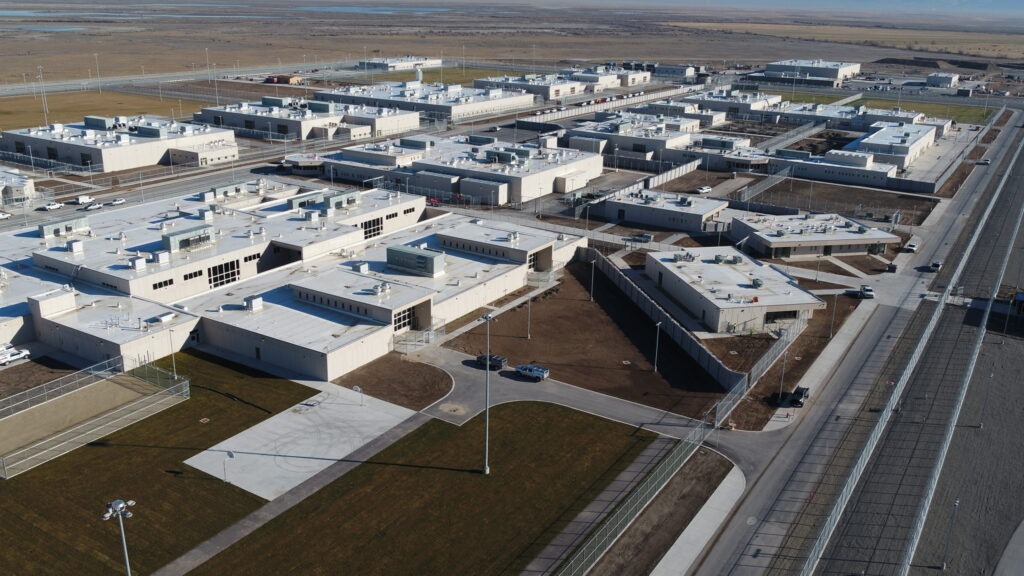
Students participating in the Pro Bono Initiative at the College of Law have a new way to serve community members: a legal site at the Utah State Correctional Facility 15 miles northwest of campus.
Audreauna Lowry, who serves as a student director at the prison legal site along with Skye McBride, worked at the state appellate public defender’s office in Idaho before starting law school. Because she worked with clients who were incarcerated, Lowry says she always had a goal of doing pro bono work. She approached Pro Bono Initiative Director Dr. Caisa Royer about working with clients at the prison, and Royer worked with the Utah State Correctional Facility to get clearance, have volunteers trained, and establish times for students to visit.
“This would never have been possible without Dr. Royer. She’s the soul behind this project,” Lowry says.
Through the program, which officially began in October 2023, students conduct in-person intakes with incarcerated clients and identify their individual legal needs. Students might also research the issues and compile legal resources or observe attorney consultations for clients with more complicated legal issues, such as immigration.
“We are essentially giving them enough information for a resolution on their own. If they can’t resolve it, then they’ll come back for an attorney consultation,” Lowry explains.
While students are limited to discussing legal issues not related to criminal convictions, the Board of Pardons, or a grievance, many clients come to the prison legal site concerned about finances.
“You’d be surprised how many incarcerated people have debilitating medical debt from being hospitalized or having long COVID-19. We’ve been able to do a lot of research, and I think we’re on the right track to giving good information, like how do you file for bankruptcy if you’re incarcerated? How do you deal with debts on the outside if you’re incarcerated?” says Skye McBride, prison legal site student director. “Just being able to provide that kind of information has been really incredible, and I think it is life-changing for people who are incarcerated, because they don’t make a lot of money. They make less than minimum wage and don’t have the financial means to take on that stuff.”
With 19 students participating so far and five attorney volunteers providing expertise in family law and immigration, volunteers at the prison legal site have met with more than 100 clients at the prison and had more than 300 applications for services.
“The program meets a critical need for folks who are incarcerated at Utah State Correctional Facility. Individuals who are incarcerated in Utah have very limited access to legal services, and this program offers access to legal information and support to people who would otherwise have almost no access at all,” Dr. Caisa Royer says. “Accessing the courts is hugely intimidating for anyone, but especially to people who are incarcerated and don’t have the option to search the internet for easy answers to their questions. So many of the questions we hear are simple, but people who are incarcerated are commonly deprived of access to information.”
McBride notes that they still have far to go in ensuring access to justice for all. There is also a stigma about working with those who are incarcerated, so she enjoys making a measurable impact by helping them solve problems they otherwise may not have been able to solve.
“Access to legal information isn’t required by our constitution for civil matters, but it’s something that’s really important because people’s lives can be ruined by like civil suits and delinquent debts or just small things, even family law issues,” she says. “The average person has the resources to fight that—they have money, they have internet, they have family members supporting them—but for someone who’s incarcerated, they lack most of those things at this time in their life. It’s really fulfilling just to listen to their problems and connect, just to show up for people that a lot of people don’t show up for.”
Lowry says it’s also rewarding to be a positive light in the legal realm for the incarcerated community.
“Many of them have had public defenders whom they have bad opinions about on a variety of different issues, and so we’re showing them that the legal field is trustworthy, to kind of build that trust back up with them,” she explains. “We want to help you. We’re here to help.”
Royer is excited that the prison legal site continues to grow and hopes more clients will learn about the opportunity.
“I’m very proud of the community we’re building at S.J. Quinney of individuals dedicated to spreading access to legal information to even the most disadvantaged corners of the state,” she says. “Working at the prison is a dream, and it’s so fun to have students deeply invested in this journey.”
Attorneys: We need your help. To volunteer with the Pro Bono Initiative’s prison legal site, email probono@law.utah.edu.
